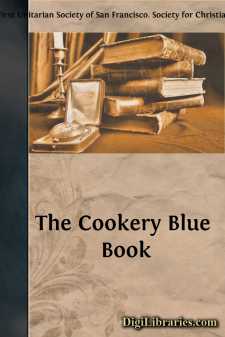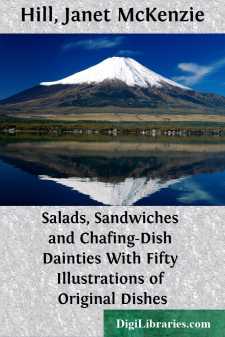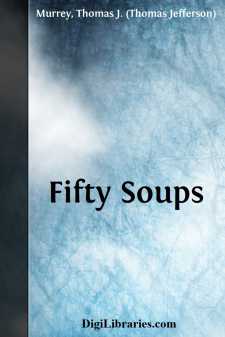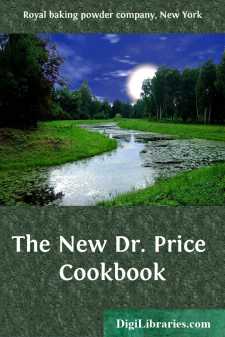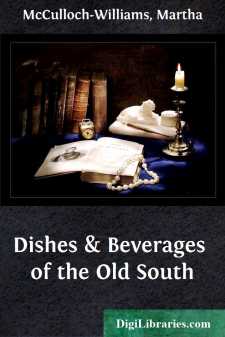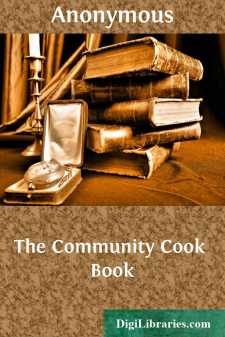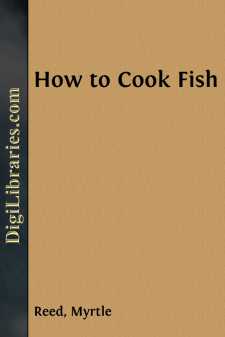Cooking
- General 70
- History 1
- Reference 10
- Regional & Ethnic 3
- Vegetarian 10
Cooking Books
Sort by:
COOKED FISH Canapés Cold boiled fish makes excellent canapés. To each half pint of fish allow six squares of toasted bread. If you have any cold boiled potatoes left over, add milk to them, make them hot and put them into a pastry bag. Decorate the edge of the toast with these mashed potatoes, using a small star tube; put them back in the oven until light brown. Make the fish into a creamed fish. Rub...
more...
SOUPS. Bouillon Soup. 4 pounds of round of beef cut into dice pieces. Trim off all fatty skin. 4 quarts water; 1 teaspoonful celery seed; 4 large onions; 6 large carrots; bunch of parsley; 6 blades of mace; 16 whole cloves, salt and pepper to taste. Pour on the water, and let it simmer six hours, skimming carefully, for if any grease is allowed to go back into the soup it is impossible to make it...
more...
INTRODUCTION Once upon a time there was a little girl named Margaret, and she wanted to cook, so she went into the kitchen and tried and tried, but she could not understand the cook-books, and she made dreadful messes, and spoiled her frocks and burned her fingers till she just had to cry. One day she went to her grandmother and her mother and her Pretty Aunt and her Other Aunt, who were all sitting...
more...
There is positive need of more widespread knowledge of the principles of cookery. Few women know how to cook an egg or boil a potato properly, and the making of the perfect loaf of bread has long been assigned a place among the "lost arts." By many women cooking is considered, at best, a homely art,—a necessary kind of drudgery; and the composition, if not the consumption, of salads and...
more...
by:
Florence Daniel
I.—UNFERMENTED BREAD. 1. COLD WATER BREAD. 1-1/4 lb. fine wholemeal flour to 3/4 pint water. Put the meal into a basin, add the water gradually, and mix with a clean, cool hand. (Bread, pastry, etc., mixed with a spoon, especially of metal, will not be so light as that mixed with a light cool hand.) Knead lightly for 20 minutes. (A little more flour may be required while kneading, as some brands of...
more...
REMARKS ON SOUPS. Soups, like salads, present an excellent opportunity for the cook to display good taste and judgment. The great difficulty lies in selecting the most appropriate soup for each particular occasion; it would be well to first select your bill of fare, after which decide upon the soup. The season, and force of circumstances, may compel you to decide upon a heavy fish, such as salmon,...
more...
BREADS, BISCUITS AND ROLLS Dr. Price's Baking Powder may be used instead of yeast to leaven bread. It does precisely the same work; that is, raises the dough, making it porous and spongy. The great advantage of bread made by this method is in time saved, as it can be mixed and baked in less than two hours. Milk bread needs little or no shortening, and less flour is required than when water is...
more...
Grace before Meat"Let me cook the dinners of a nation, and I shall not care who makes its laws." Women, if they did but know it, might well thus paraphrase a famous saying. Proper dinners mean so much—good blood, good health, good judgment, good conduct. The fact makes tragic a truth too little regarded; namely, that while bad cooking can ruin the very best of raw foodstuffs, all the arts of...
more...
by:
Anonymous
FOREWORD The Community Cook Book is a collection of recipes chosen from many hundreds that may well be considered representative of the best to be found in any of the more intelligent and progressive of American Communities in which a part of the population make occasional visits to all parts of the country from which they bring back choice recipes to contribute to the neighborhood fund. Added to this,...
more...
by:
Myrtle Reed
THE CATCHING OF UNSHELLED FISH "First catch your hare," the old cookery books used to say, and hence it is proper, in a treatise devoted entirely to the cooking of Unshelled Fish, to pay passing attention to the Catching, or what the Head of the House terms the Masculine Division of the Subject. As it is evident that the catching must, in every case precede the cooking—but not too far—the...
more...



